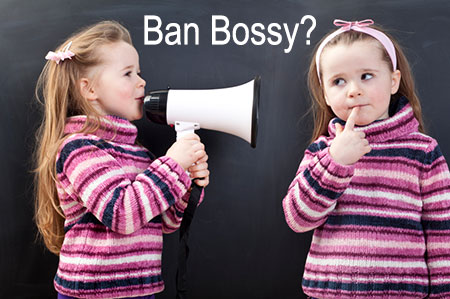March 14, 2014
Ban Bossy. . . Really?
What do you think of when you hear the word “bossy?”
Recently, the Lean In organization, headed by Facebook COO Sheryl Sandberg, joined forces with the Girl Scouts of USA to start a Ban Bossy campaign. Their intention is to encourage more young girls to lead. As I watched one of the Ban Bossy videos, featuring strong, powerful women declaring that we should ban the word bossy, I found myself supportive of their intentions, but not of the method.
Banning a word is not the way to get young girls to lead. Here’s why.
Education and parental involvement, not censorship
There will always be words that you and I find egregious and disagreeable. Some of the words I’d personally like to ban are words such as genocide, war, and nuclear bomb. These, in my mind, are the true dangerous words in our culture… but bossy? Really?
First, to censor words is to lose your first amendment freedoms. The old adage “sticks and stones can break your bones”… yes words can hurt, but the inoculation against words is to make your children self-actualized and to create a culture of mutual respect for boys and girls, men and women. Censorship doesn’t teach our children to be leaders, it teaches them that to blame and exclude is the answer . . . and exclusion is the opposite of what the Ban Bossy movement is supposed to be about.
Second, from my years as an educator and researcher with a Ph.D. in psychology and Doctorate of Education, I know that if you teach your children to be victims, they will grow up to be immature, narcissistic adults, unable to suffer the slings and arrows of what life throws their way. You have to strengthen your children and empower them to deliberately reject those things that can hurt them. This will never happen if you attempt to remove all obstacles from their path. Children need to experience frustration so that they can know what is right for them and decide which path to take and which to reject. If you saturate your children with superficial language, they will edit their communication away from authenticity. What we need is not censorship, but education and parental involvement.
Bossy does not always equal leadership skills
The word bossy is not necessarily a highly charged word; it’s a descriptor. According to Google’s dictionary, the definition of bossy is “fond of giving people orders; domineering.” It’s a word that, when used correctly, can be a wonderful teaching tool. For example: if your seven-year-old child is trying to control siblings or other children, and you tell him/her that no one likes to be bossed around, you are teaching your child how to interact in relationships and friendships.
Empower young girls, and “bossy” becomes irrelevant.
Childhood is a time when children are meant to test themselves against their environment authentically. The goal of parenting is to guide your children to be self-actualized, so that they are able to listen to their own inner voice, individuate, and become whole people who can follow their own authority. This is how you teach your children to become leaders, to follow their own vocation.
If you teach your children how to be assertive, not aggressive; how to lean in without dominating; how to be secure and have good self-esteem so that possessiveness and control don’t become part of their relationship patterns, then they won’t be vulnerable to the opinions or agendas of others.
If you teach your children to validate and value themselves, if you model for your children what it is to be a friend and a good citizen, if teachers and parents alike educate children about how to interact socially, give them social cues – empathy, proper rules of engagement, courtesy – and teach them what it is to be a part of a family, a community, and a world… then your children won’t be easily influenced, or intimidated by mere words. Further, a self-actualized and individuated child won’t be dictated too by the peer pressure of others.
And finally, be what you want to see. If your social relationships are authentic rather than agenda-driven, and if your friends share your values, then you will teach your children, by example, how to trust and value themselves and fulfill their potential, without fear of being labeled, characterized, or influenced by others. By valuing yourself, you will value your children and transfer to them the necessary self-esteem that will allow them to successfully navigate life’s challenges.
Ban bossy? I don’t think so. Let’s instead focus on empowering young girls to realize their full potential and to stand strong, so that words really will, as the old adage goes, never hurt them.
Filed Under: Blog, Education, Parenting & Family
Tagged With: ban bossy, empowering young girls to lead, Parenting













